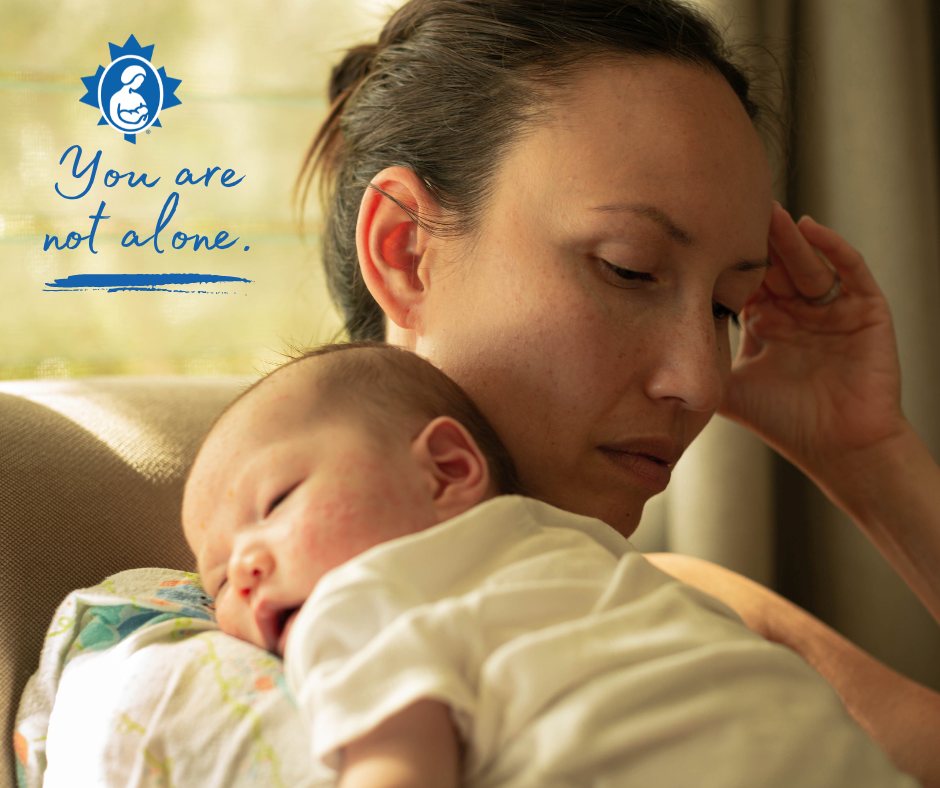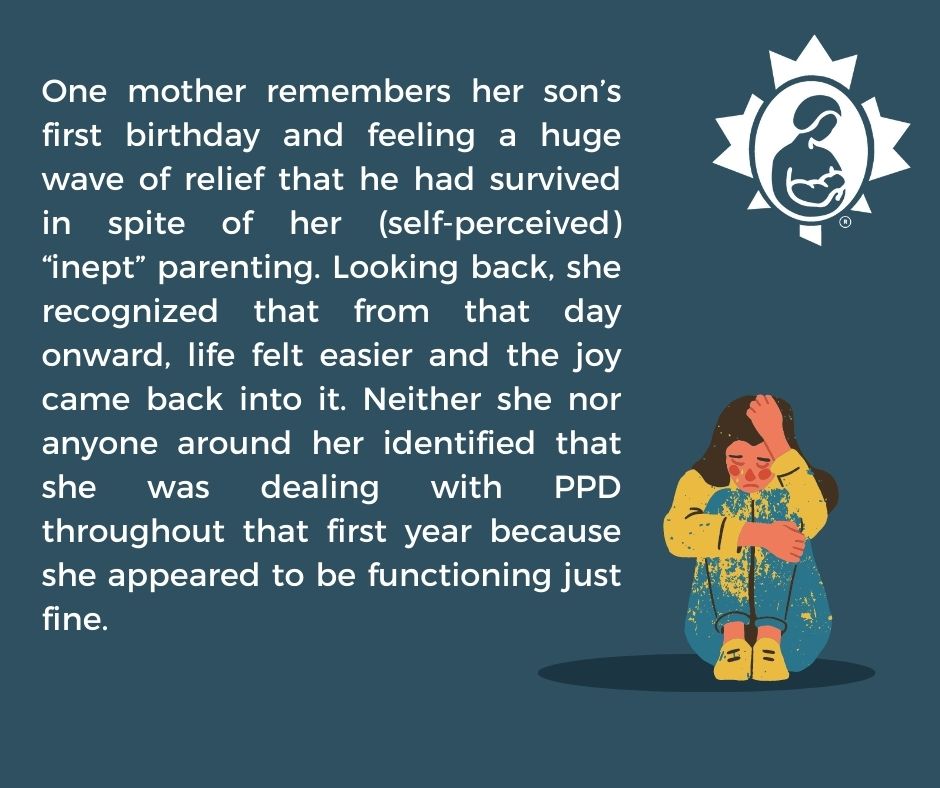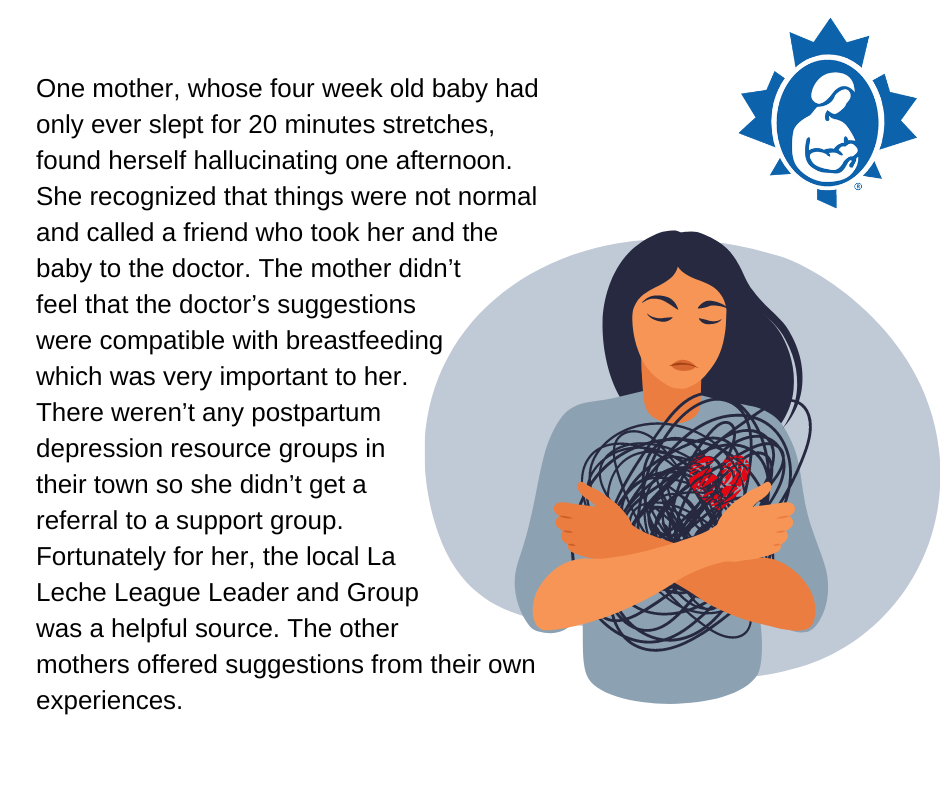
Like many new parents, you may have the experience of being completely overwhelmed caring for your new baby.
“Baby Blues”
You may find yourself feeling sad and weepy. This often starts on the day your milk supply increases (‘comes in’) between days three and five. This feeling of sadness may come and go in waves over a few hours or days. We call this the “baby blues”. It improves as breastfeeding is established and as the pregnancy and birthing hormones leave your body. This is usually within one to two weeks. About 50 to 80% of mothers experience the “baby blues”. It can be very stressful if you are having difficulty breastfeeding or if you think your baby may not be getting enough. It helps to get the support you need from healthcare professionals and those you love. Be patient with yourself and your baby in these early days. Talking with other new mothers at La Leche League meetings lets you know you’re not alone.
Additional related information:
How Partners and Supporters Can Help
Positioning and Latching
How to Know Your Baby is Getting Enough Milk
Establishing Your Milk Supply.
Postpartum Depression (PPD)
Unlike the baby blues, postpartum depression (PPD) symptoms don’t fade away after a few weeks. They can start any time during the first year after birth. About 13% to 20% of mothers and 2% to 25% of fathers experience PPD. If the underlying causes aren’t dealt with, the symptoms may continue to get worse over time. Mothers experiencing PPD report:
- feeling that they are not doing a good job of parenting.
- feeling guilty for having had a child.
- despairing that they will never feel happy again.
- having difficulty concentrating and making decisions.
- having disrupted appetite and sleep patterns (beyond what is normal with a young baby in the house).
- being isolated because they don’t have the energy to get out of the house or to interact with other people.
Very occasionally (less than 1%) mothers with PPD have thoughts of hurting themselves or their baby. Immediate mental health help is needed in these cases. Often hospitalization and medication is required to stabilize their symptoms and to keep themselves and their babies safe.
Some of the predictors of postpartum depression are:
- previously diagnosed depression or other mental illness.
- history of abuse.
- high levels of systemic inflammation, for example from an infection or from severe trauma, burns or bleeding.
- pain from childbirth or breastfeeding. the mother’s perception that she had a negative birth experience.
- This is different from having an actual negative outcome of the birth. having a baby with a “high needs” or “intense” temperament.
- lack of social support.
Physical and psychological stressors increase inflammation. Recent research suggests that inflammation may be a risk factor for depression. Current treatments for PPD include reducing maternal stress and decreasing inflammation. Breastfeeding and exercise help reduce maternal stress. Medications may be needed to reduce inflammation.
The Edinburgh Postnatal Depression Scale is a self-screening tool that you can use to identify whether or not you are depressed. Perinatal Services BC has printable copies in English and several other languages.
If you are experiencing relatively mild postpartum depression, you may not recognize what is happening to you. Our society expects new parents to be happy to have their babies. It can be hard to talk about your feelings if you do not feel safe speaking about them. You may be afraid of being judged for not being thrilled about life with a baby.
Postpartum Anxiety (PPA)
Some new parents experience constant worry or fear after having their babies. They may have difficulty sleeping, experience fatigue (beyond what is to be expected with a newborn) and have other symptoms of anxiety. This is called Postpartum Anxiety (PPA). Symptoms of PPA are often similar to symptoms of PPD. Parents may have both conditions. About 6% to 28% of women may experience PPA during the first six months after giving birth. Women are twice as likely to experience PPA than men.
Postpartum Obsessive Compulsive Disorder (PPOCD)
Between 3 to 5% of new parents may experience a type of postpartum anxiety called Postpartum Obsessive Compulsive Disorder (PPOCD). Parents with PPOCD experience persistent, repetitive, frightening thoughts they cannot control. These obsessive thoughts are about perceived dangers to the baby. Parents are very unlikely to act upon these thoughts. Instead they are often hypervigilant (overly careful) and compulsive about protecting the baby from these perceived dangers. Many new parents do not report these feelings due to fears that the baby will be removed from their care. Untreated PPOCD can lead to difficulty bonding with and caring for the baby. Obsessive thoughts and compulsions can also impact a mother by affecting her ability to sleep or care for herself.
Common obsessive symptoms of PPOCD are:
- worries that the baby will be injured accidentally or intentionally.
- worries that the baby will develop a serious illness.
- worries that the baby will be poisoned by food or chemicals in the environment.
- fears of being left alone with the baby.
- fears of making decisions that will negatively affect the baby.
Common compulsive behaviours of PPOCD are:
- removing sharp objects such as knives and scissors from the home.
- obsessively checking on the baby when she sleeps.
- constantly cleaning.
- asking others for reassurance that the baby has not been harmed or abused.
- avoiding certain behaviours because of fears of harming the baby such as bathing, feeding or holding the baby.
These symptoms usually appear around 2 to 3 weeks postpartum. They often come on gradually and get worse over time.
Postpartum Post-Traumatic Stress Disorder (PTSD)
Trauma experienced during childbirth may lead to postpartum PTSD. It is important to note that even a birth that many see as “successful” can still be experienced as traumatic by the mother. Postpartum PTSD can increase the risk of developing PPD. Traumatic events can include:
- feeling very worried about your health or your baby’s health during birth.
- extreme pain. complications during childbirth. feeling unsupported by staff. feeling like you have no control over your body or birth.
- feeling disrespected, abused, humiliated, or mistreated during childbirth.
Symptoms of Postpartum PTSD include:
- Re-living or re-experiencing traumatic aspects of the birth
- Nightmares and flashbacks
- Avoidance of people, places or situations related to the birth (for example: avoidance of hospitals)
- Sleep difficulties
- Feelings of detachment (for example: feeling distant from your baby)
- Episodes of frequent crying
- Changes in appetite
- Feeling hopeless
- Loss of interest in things you used to enjoy
Getting Help
If you have any of these mental health conditions it can also be confusing for those around you. Partners may be unsure of how to help. They don’t understand that you can’t just “snap out of it and cope like other new mothers.” Older children may feel uncertain about the changes in your behaviour. You may struggle to respond to your newborn. Breastfeeding can help you maintain the relationship with your baby. If you are chronically depressed or anxious, your newborn may be negatively affected. Thus, getting treatment is important. When symptoms are severe, it is often those around you (partners, relatives and friends) who put together the clues. They may be the ones to suggest that you get a proper diagnosis and support.

Treatment
The treatment of these mental health conditions generally focuses around three major strategies:
- medication,
- getting enough good quality sleep,
- and family/community support.
It is important to work with your healthcare provider to find a strategy that works for you and your family. Ideally, this strategy will include all three of these approaches.
Lack of sleep is one of the biggest factors in making symptoms worse. If you are breastfeeding and struggling with sleep deprivation, ask for help from your support network. You’ll want to find ways to get more sleep while maintaining your milk supply and breastfeeding relationship with your baby.

Many people are under the impression that breastfeeding is not recommended when treating mental health conditions with medication. This belief can make some mothers reluctant to consider medication as a treatment option. If you want to continue breastfeeding, let your healthcare professional know that you want a medication that is compatible with breastfeeding. If the suggested medication is not compatible with breastfeeding, you can ask for a different one.
Other treatments include:
- Increased consumption of long-chain fatty acids (omega 3s)
- Exercise
- SAMe (S-adenosyl-L-methionine) It is a compound found naturally in the body. A synthetic version may be available as a dietetic supplement.
- Cognitive-Behavioural Therapy (group or individual).
Most of the above treatments reduce inflammation in the body. The New Hampshire Breastfeeding Task Force’s document “A Breastfeeding-Friendly Approach to Depression in New Mothers” is an excellent resource for parents and professionals who want to look at all the options for treating PPD including drug therapy. See this PPD resource webpage for more resources.
Successful breastfeeding can be protective against developing these conditions. It can also be a helpful coping strategy. A combination of better latching technique and learning how to nurse lying down can help overcome difficulties.
Some women find that stopping breastfeeding improves their depression while others find that it worsens their depression. The decision to breastfeed or not is entirely up to you.
If you suspect that you or someone you love has PPD, PPA or postpartum PTSD, it is important to contact a healthcare provider. A La Leche League Leader can provide helpful support and information. If you think any of your mental health symptoms are related to a difficult birth experience see Moving Forward After a Traumatic or Difficult Birth Experience for more information.
Additional Information
Postpartum Support International
Postpartum Mood Disorders - LLL International
Postpartum Depression - LLL International
Postpartum Depression - Kathleen Kendall-Tackett, PhD, IBCLC
International OCD Foundation - Perinatal OCD Resource Center
Postpartum Depression - Postpartum OCD
References
Abramowitz, Jonathan. (2023). What are Postpartum and Perinatal OCD? International OCD Foundation.
Ali, E. Women’s experiences with postpartum anxiety disorders: A narrative literature review. International Journal of Women’s Health, 2018; 10: 237-249. DOI: 10.2147/IJWH.S158621
Balan, I., Patterson, R., Boero, G., Krohn, H., O'Buckley, T.K., Meltzer-Brody, S., Morrow, A.L. (2023). Brexanolone therapeutics in post-partum depression involves inhibition of systemic inflammatory pathways. eBioMedicine, (89).
Bass, P. F.; & Bauer, N. S. Parental postpartum depression: More than “baby blues”. Contemporary Pediatrics, Sept. 2018; 35(9): 35-38. (accessed 8 October 2022).
Bränn, E., Fransson, E., White, R. A., Papadopoulos, F. C., Edvinsson, Å., Kamali-Moghaddam, M., Cunningham, J. L., Sundström-Poromaa, I., & Skalkidou, A. (2020). Inflammatory markers in women with postpartum depressive symptoms. Journal of neuroscience research, 98(7), 1309–1321.
Fairbrother N, Collardeau F, Albert AYK, et al. (2021). High prevalence and incidence of obsessive-compulsive disorder among women across pregnancy and the postpartum. J Clin Psychiatry.
Kendall-Tackett, K., Cong, Z., & Hale, T. W. (2011). The effect of feeding method on sleep duration, maternal well-being, and postpartum depression. Clinical Lactation, 2(2), 22-26.
Nierengarten, M. B. Why screen new fathers for postpartum depression? Contemporary Pediatrics Journal, 2018; 35(9) September 2018. (accessed 8 May 2022).
Sawyer K. M. (2021). The role of inflammation in the pathogenesis of perinatal depression and offspring outcomes. Brain, behavior, & immunity - health, 18, 100390.
Srimoragot, M., Hershberger, P. E., Park, C., Hernandez, T. L., & Izci Balserak, B. (2023). Infant feeding type and maternal sleep during the postpartum period: a systematic review and meta-analysis. Journal of sleep research, 32(2), e13625.
Updated 2023
